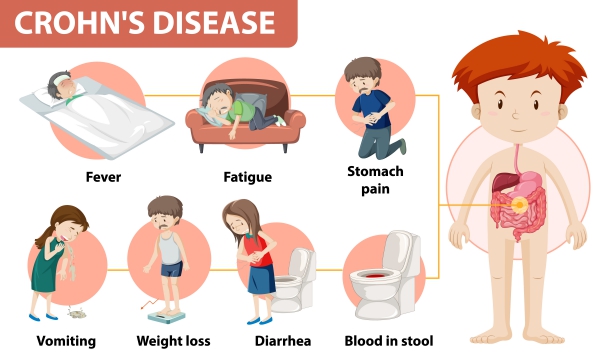Crohn's Disease, Digestive tract disorder, Inflammatory Bowel Disease
Description : Crohn’s disease is a condition that causes inflammation of your digestive tract (gastrointestinal
Article Details :
What is Crohn’s disease?
Crohn’s disease is a condition that causes inflammation of your digestive tract (gastrointestinal tract). It is a type of inflammatory bowel disease (IBD). The digestive tract is the pathway through which food passes. It comprises of the mouth, stomach, small intestines, large intestines, rectum and anus. This condition may lead to severe bloody diarrhoea, abdominal pain, weight loss, malnutrition and excessive fatigue. In addition, this condition can affect any part of the digestive tract. People affected by this disease may experience periods where symptoms are present (relapse) and periods where there is no symptoms (remission).
In the United States, around 201 people are affected by this disease per 100,000 population. People being in the upper socioeconomic classes are more commonly affected by this disease than those in the lower socioeconomic classes. Crohn’s disease occurs more commonly in people aged between 15-30 years and in women aged between 60-70 years. In addition, inflammatory bowel disease is more common in females than in males. Furthermore, it is more common in whites than in blacks. The rate of Crohn’s disease is higher in Ashkenazi Jews than eastern European Jews.
Unfortunately, there is no cure for Crohn’s disease. However, there are several treatment options available to help relieve your symptoms and improve your quality of life.
What are the causes and risk factors of Crohn’s disease?
The exact cause of Crohn’s disease remains unknown to this day. However, there are several factors which may increase your risk of developing this condition and these include:
- Family history: Having a parent or sibling suffering from this condition, increases your risk of developing this condition. 1 in every 5 people affected by this condition, has a family member with the disease.
- Age: Crohn’s disease can affect people of all ages. However, it is more common in people aged between 15-30 years and in women aged between 60-70 years.
- Cigarette smoking: The most controllable risk factor of Crohn’s disease is cigarette smoking. It may increase your risk of suffering from a more severe form of the disease and having surgery.
- Non-steroidal anti-inflammatory drugs (NSAIDs): These medications do not cause the disease but may cause inflammation of your gastrointestinal tract. Examples of these medications include ibuprofen and diclofenac sodium amongst others.
- Race: Crohn’s disease is more common in whites than in blacks. In addition it is more common in Ashkenazi Jews than eastern European Jews.
What are the signs and symptoms of Crohn’s disease?
The signs and symptoms of Crohn’s disease include:
- Fever
- Diarrhoea: People suffering from Crohn’s disease often complain of prolonged diarrhoea. In addition, if the colon (large intestine) is involved, there may be presence of pus, blood or mucus in your stool.
- Cramping lower abdominal pain
- Urgency to defecate
- Loss of appetite
- Nausea and vomiting
- Lesions or abscesses near the anus (perianal lesions or abscesses)
- Constipation
- Malnutrition
- Weight loss
- Excessive fatigue
- Mouth sores
Other signs and symptoms of Crohn’s disease include:
- Inflammation of the liver which may manifest as fatigue, jaundice (yellowing of the skin and whites of the eyes) and right upper abdomen.
- Inflammation of the skin, eyes and joints.
- Anaemia (iron deficiency anaemia)
- Kidney stones

Making a diagnosis
To make a diagnosis, your doctor will first take a detailed history from you to know more about your symptoms. After the history taking, your doctor will perform a thorough physical examination to look for signs of Crohn’s disease. Your doctor may order some tests in order to confirm the diagnosis and these include:
- Complete Blood Count (CBC): The CBC is done to assess whether there is presence of anaemia which may be due to iron deficiency, vitamin B12 deficiency, chronic blood loss or chronic inflammation.
- Chemistry panel: Analysis of your electrolytes is done to assess your level of hydration and renal function. A low level of albumin (hypoalbuminemia) is common in people suffering from Crohn’s disease. In addition, your liver function test may be deranged due to chronic inflammation.
- Stool studies: Stool samples are taken to test for the presence of white blood cells (WBCs), blood, pathogens and parasites. In addition, this test is also done to rule out presence of infection because initiation of immunosuppressive agents which are usually used in the management of Crohn’s disease.
- Plain abdominal x-ray: This test is done to assess Read more





